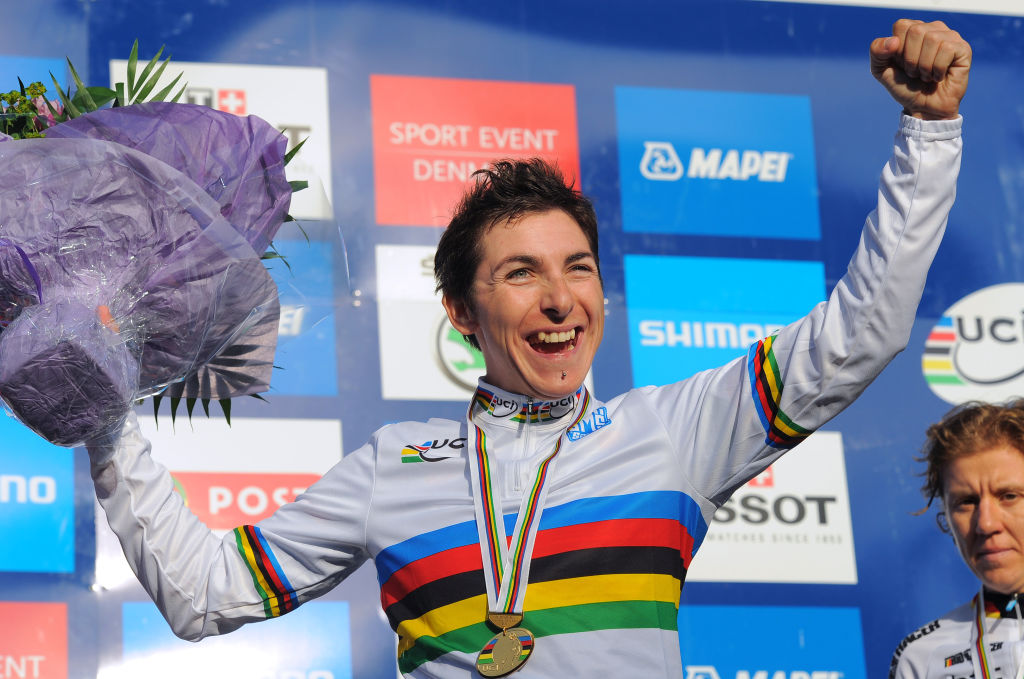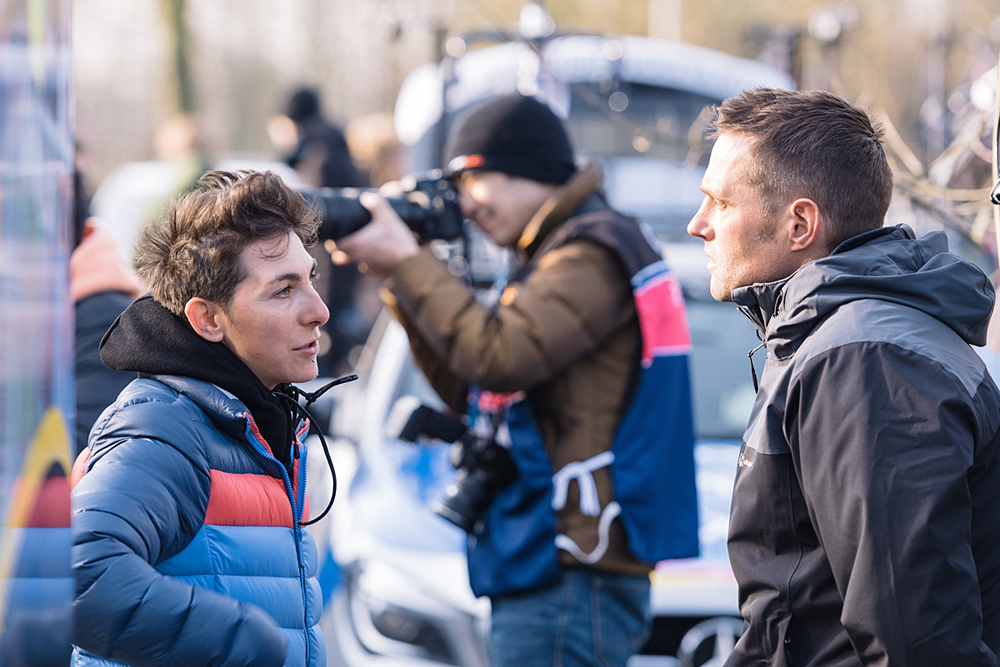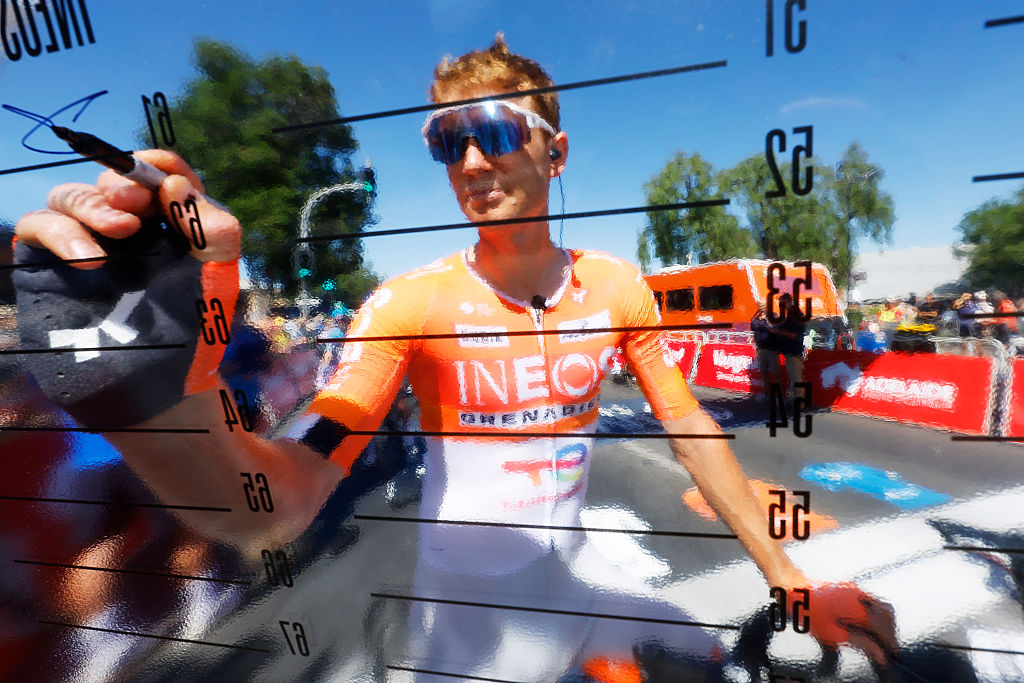The tactician: Giorgia Bronzini
Two-time road world champion on her transition to Trek-Segafredo director

The latest race content, interviews, features, reviews and expert buying guides, direct to your inbox!
You are now subscribed
Your newsletter sign-up was successful
Procycling magazine: the best writing and photography from inside the world's toughest sport. Pick up your copy now in all good newsagents and supermarkets, or get a Procycling print or digital subscription, and never miss an issue.
Two-time road world champion Giorgia Bronzini stepped off the bike and into the team car as a directeur sportif for the new Trek-Segafredo women’s team. The Italian talks to Procycling about how she hopes to pass on her race craft
This article first appeared in Procycling magazine issue 254 2019
It was only last August, when Giorgia Bronzini turned 35, that she finally decided it was time to get her own computer. Until then, the Italian, just weeks away from the end of her 15-year professional racing career, had been making do with a smartphone to organise her life for most of the past decade.
If she needed some paperwork done – or “paper sh*t” as she calls it with a smile – like sending off an invoice, she just gave her brother a call to help her out. Yet big change was on the horizon in the form of the end of her career as a racer and the start of a new life inside the team car, as a directeur sportif with Trek-Segafredo’s soon-to-launch women’s squad. It was probably time, everyone around her started to say, that she got a computer.
The paperwork is the aspect of Bronzini’s new role that she is most apprehensive about, although she’s sat deep in conversation, huddled in front of a laptop with her new colleague and former sprint rival Ina Teutenberg, when Procycling arrives. It’s less than 48 hours before the team’s first European stage race, Setmana Ciclista Valenciana, and the pair are finalising plans. They’re the only two people in the large, dark dining room of their hotel in Gandia, a small city on the eastern Spanish coast, south of Valencia. Shadows from the empty chairs and tables are cast around them.
It’s mid-February and the tourists that would usually flood the holiday resort are nowhere to be seen yet. The hotel is normally closed this time of year, but has opened its doors specially for the team, which would explain why its chilly inside - it’s running on minimum function. Teutenberg, who retired from racing in 2013, has a few years’ experience over Bronzini in the sports directeur chair and is proving an invaluable mentor – and Bronzini is keen to soak up every bit of advice she can.
The latest race content, interviews, features, reviews and expert buying guides, direct to your inbox!
“I have never been a huge fan of computers,” Bronzini says, when she sits down with Procycling. “I am a bit more Italian style. I make a phone call or, yeah, I am organised but I am not super… For example, l never looked at my files on training [when I was racing]. I was not passionate about numbers, I always went on feeling. I had a job to do, and maybe if a coach said to me can you send over some, I did, but I never analysed much. After, I knew if I had done good or not and I would call up the coach and say, ‘Hey, today was not the day – I did not reach the power, I struggled.’ Or I called up and said, ‘Today was really good.’
“I’m more a person who likes to talk and discuss, and look in the eyes than writing down - the things that I need to do for this part of the job.”
It’s easy to assume that someone with as much experience of professional racing as Bronzini would easily transition into a sports director role. Bronzini is a three-time world champion, twice on the road and once on the track, with 88 UCI-ranked road victories to her name. She was one of the most successful and prolific riders of her particularly talented generation. Yet even Bronzini admits she is nervous ahead of her debut with the team.
Retirement edged onto the horizon at the end of the 2017 season. Bronzini had left Wiggle-High5 after five seasons and was searching for one more contract, one more year where she’d be given opportunities to ride for herself, to score a few more wins and end her career on a high. She joined Cylance Pro Cycling, but behind the scenes started to think about what would come next.
“I was tired of training. I was not tired to race and to feel the race spirit - not at all - but this time I was really tired of training… Then I said, ‘Okay, if I stop, what would be the option?’” Bronzini says. “I think in life I am a bit open to try other jobs. I have a passion for cooking, I have passion in the restaurant world. So if there was not this opportunity [with Trek] and I had no other goals in my hands I probably would turn the page and do something else.”
Yet during the year Bronzini got a call from an old friend, Luca Guercilena, manager of Trek-Segafredo, with whom she worked at the Italian Cycling Federation. He told her about the plans to launch a Trek women’s team for 2019, and asked if she would join as a DS. “That was probably the drop, the point I knew to turn the page. Then, straight away, I had a really good job on my hands.”
Bronzini still had a job to finish before she joined Trek, and one dream left to try and fulfil; to end her racing career with a win. Her last race was the Madrid Challenge, newly extended to two days in 2018. The first stage was a team time trial, but the second day, held on the final day of the men’s Vuelta a España, was a circuit race held around Madrid city centre –a perfect target for a sprinter like Bronzini.
The easy bet would have been on a sprint finish – that’s what the peloton seemed to be anticipating – but Bronzini had other ideas. She bridged across to a breakaway up the road, initiated by her team-mate Rossella Ratto, and the group had the strength to stay away to the finish. Bronzini, perfectly led out by Ratto, won the reduced sprint for a fairytale finish to her career.
“For me, I think it was one of the best wins in my career,” Bronzini says. “I could not believe it, still after the line. It was my dream. I dreamed when I was younger I would like to finish my career with a win, and then I did. It was amazing. I made true one dream that was in my heart. I was super happy.”
The nature in which Bronzini won, however, made the victory seem even more fitting. By her own admission she was never necessarily the fastest rider or the most powerful during her career, but one advantage Bronzini had over her rivals was her tactical brain and the ability to read a race. “How you would describe me as a rider was in this kind of race,” she continues. “Because it was a circuit, everyone was waiting for the bunch sprint and in the end came the breakaway. The breakaway stayed away.”
It’s this tactical brain that is likely to make Bronzini one of the most astute DSs in the women’s peloton, and it’s this knowledge and experience she wants to pass over to the riders she’s now working with. “Now you give a lot of information to the riders… you really give everything. We were discussing that they don’t use their brains because you give everything, they are waiting for you to say, ‘Step on the pedals now.’ Come on! It is your job - you know if someone is attacking that you need to follow. Sometimes, they are in a comfortable zone because there is someone telling them exactly what to do. We want them to use their brain and we are going to teach them to do this.
“We are going to provide everything, obviously, but we also want them to put that effort in, not just on the physical side. They need to think as a team, they need to act as a team, they need to respect their team-mates, they need everyone to have a rule they respect. Go in with the same goal together… I think the sense of a team is the main thing we need to get them to understand.”

As a rider, Bronzini was never afraid to challenge the status quo. If coaches or team managers gave her instructions or tactics, she asked why she was doing it – not out of arrogance or stubbornness to do what she wanted, but to better understand the process, method and thinking behind it. As Bronzini got older and more successful, her confidence in her own belief and knowledge grew and she began to speak up more and more, collaborating rather than sitting back, particularly when she worked with the traditionally old-school Italian national team. It’s an attitude she hopes to pass on to the riders at Trek.
“I really will hope that when I come down with a tactic or my idea, I would like the girls to question me and ask why you think like this,” Bronzini says. “Also, what would be really important for us would be the feedback they are going to give to us after the race; we can see, but we are not in the peloton [with them].
“I’m not their mum, I’m not their sister, I’m a directeur. I could be wrong, and they could be wrong. If so, we need to just speak to each other in an adult way and find
a balance. If someone has a crash or has a health problem, I am never going to say you need to race or you are going to race. [Riders should be] adult enough or professional enough to know if you are prepared and if you can handle it. I’m never going to point the finger and ask the girls to do something that is not in their mind.”
Bronzini turned pro in 2004,when she was just 20, and her career has spanned many significant changes in women’s cycling. While there is still ample work to do to reach parity with the men’s sport, Bronzini has witnessed the good and bad sides of cycling’s evolution. She details stories of her previous team managers who she witnessed abusing their power, ordering riders about in a way she says she will not; managers who treated riders with little respect or poorly, to, as she believes, stoke their own egos.
Today, most of the women’s pro teams are still run by men and most of the staff on teams are male. And while it’s far from the case that this means every male manager treats their riders badly, Bronzini believes there needs to be more equality, more women working in positions of management, to ensure the women’s sport is held to the same high standard as the men’s.
“I think that if the women’s peloton is going to be better and better, and some men’s teams are going to open chances to women’s teams, I will hope that it’s the same [level of] management with the men as with the women. Not use the same team manager that now is in a club team and contact them because they have experience with the women - it doesn’t work. Or, the men’s side open the women’s side up to the bad side of the men’s side. That doesn’t work,” she says.
Bronzini continues: “The UCI was happy when some of us, like me and Ina, wanted to try to bring a bit of this sense of… the women need to have respect,” she says. “We just want to give a sign that also female managers can work with the women.”
Indeed, Trek-Segafredo entering women’s cycling this season has marked a seismic shift. Though they are far from the first sponsors of a men’s WorldTour team to launch a women’s outfit – Sunweb, Movistar, Mitchelton, and Lotto-Soudal do so this year – Trek made a statement by committing to treating their women’s squad exactly the same as the men’s. All riders are paid a salary – which is not a given in the women’s peloton - have the same equipment and share the same army of mechanics, soigneurs and sports coaches as the men’s team. The squads also went to the same training camp at the beginning of the year.
“They really are giving us the same as the men,” she says. “Sometimes we are saying, no it’s too much, we don’t need it. And then they don’t mind. They want us to act like the men act. It’s a really big step, they count on us a lot on what we will achieve and we are going to give our max.”
Expectations around Trek have been high, but Bronzini and Teutenberg quickly proved they could be a formidable DS pairing. Once the first-race jitters had abated, their riders won three of the four stages at their debut Spanish race. And while Bronzini’s tactical mind, which she hopes to deploy from the team car, may be her biggest asset, she hopes to bring more than that to the new team.
“What I would like to bring even more is the happiness and smiles and be a bit more relaxed in general, because I hate to be grumpy, to be sad, to be, I don’t know, complaining. I hate this stuff,” Bronzini says. “If, when you do things with passion, without stress, with a smile on your face, everything works.”
Procycling magazine: the best writing and photography from inside the world's toughest sport. Pick up your copy now in all good newsagents and supermarkets, or get a Procycling print or digital subscription, and never miss an issue.
Follow @Procycling_mag on Twitter.
Sophie Hurcom is Procycling’s deputy editor. She joined the magazine in 2017, after working at Cycling Weekly where she started on work experience before becoming a sub editor, and then news and features writer. Prior to that, she graduated from City University London with a Masters degree in magazine journalism. Sophie has since reported from races all over the world, including multiple Tours de France, where she was thrown in at the deep end by making her race debut in 2014 on the stage that Chris Froome crashed out on the Roubaix cobbles.
